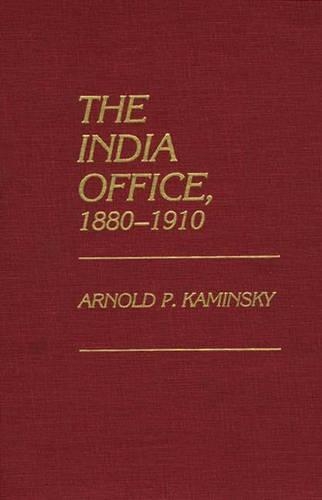
The India Office, 18801910
(Hardback)
Publishing Details
The India Office, 18801910
By (Author) Arnold P. Kaminsky
Bloomsbury Publishing PLC
Praeger Publishers Inc
21st February 1986
United States
Classifications
Tertiary Education
Non Fiction
National liberation and independence
Asian history
325.3141
Physical Properties
Hardback
316
Width 156mm, Height 235mm
680g
Reviews
Despite the fact that the India Office was for 89 years the British Home Government's largest and most complex overseas possession, the significance of its role in the formation of Indian policy, especially in its earliest years, has seldom been properly appreciated.... Kaminsky now offers an authoritative and detailed account covering the years 1880-1910. In part a biographical study of Sir Arthur Godley, Permanent Undersecretary of State for India from 1883 to 1909, and in part an exhaustive administrative history, the work is based on extensive use of public and private archives. Kaminsky casts invaluable light on the machinery of decision and policy-making, on the legal responsibilities of the constituent parts of the office, and on its relations to the Council of India, the Government of India in Calcutta, Parliament, other departments of state, and various extra-constitutional' groups like the press and lobbies. Extensive bibliography and important appendixes provide biographical notes and details of membership of the Council and its committees.-Choice
"Despite the fact that the India Office was for 89 years the British Home Government's largest and most complex overseas possession, the significance of its role in the formation of Indian policy, especially in its earliest years, has seldom been properly appreciated.... Kaminsky now offers an authoritative and detailed account covering the years 1880-1910. In part a biographical study of Sir Arthur Godley, Permanent Undersecretary of State for India from 1883 to 1909, and in part an exhaustive administrative history, the work is based on extensive use of public and private archives. Kaminsky casts invaluable light on the machinery of decision and policy-making, on the legal responsibilities of the constituent parts of the office, and on its relations to the Council of India, the Government of India in Calcutta, Parliament, other departments of state, and various extra-constitutional' groups like the press and lobbies. Extensive bibliography and important appendixes provide biographical notes and details of membership of the Council and its committees."-Choice
Author Bio
minsky /f Arnold /i P.
